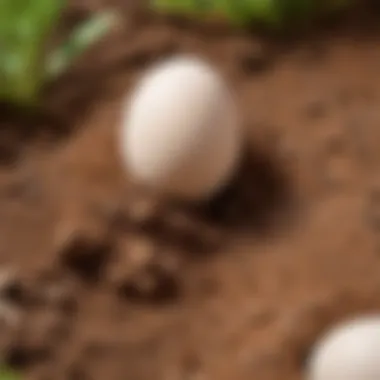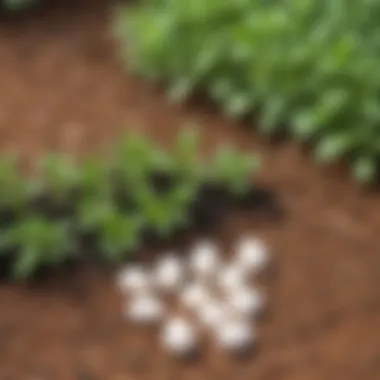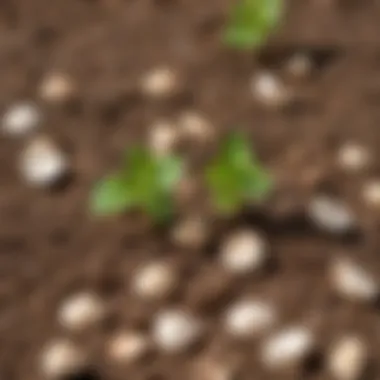Unlocking the Potential of Egg Shells in Gardening: A Comprehensive Guide


Science Fun Facts
Eggshells, often viewed as mere waste, harbor astounding benefits for your garden's soil health and pest management. From adding vital nutrients to deterring unwanted garden pests, eggshells offer a plethora of advantages in your gardening endeavors. Explore the fascinating world of utilizing eggshells in your garden as we unveil the secrets behind these overlooked gems.
Egg shells, composed mainly of calcium carbonate, serve as a rich source of calcium essential for plant growth. This mineral aids in strengthening cell walls, promoting root development, and overall plant vigor. Incorporating crushed eggshells can provide a slow-release calcium supplement for your plants, enhancing their resilience against diseases and environmental stressors.
Did you know that eggshells possess natural pest-repelling properties? When crushed and scattered around your garden, eggshells act as a deterrent for slugs, snails, and other soft-bodied pests that can harm your plants. The sharp edges of the shells create a barrier that these pests avoid, safeguarding your garden naturally and effectively.
Discover the Wonders of Science
Introducing young minds to the wonders of nature and its bountiful offerings, utilizing eggshells in gardening transcends mere planting techniques; it fosters curiosity and a deeper understanding of ecological systems. Through engaging activities and hands-on experiences, children can grasp the importance of sustainability and organic practices, laying the foundation for responsible stewardship of the environment.
Watching plants thrive with the supplementation of eggshells serves as a captivating lesson in botany and chemistry. Observing how calcium influences plant growth and health provides a real-life application of scientific principles in everyday gardening practices. By connecting scientific concepts to tangible outcomes in the garden, children can broaden their knowledge while fostering an appreciation for nature's intricacies.
Science Quiz Time
Engage young learners in a delightful exploration of the role of eggshells in promoting garden vitality with interactive quizzes that challenge their understanding and critical thinking skills. Test their knowledge on the benefits of calcium for plant growth, the mechanisms behind pest deterrence using eggshells, and the ecological impact of sustainable gardening practices. Incorporate brain teasers and puzzles to make learning entertaining and rewarding, offering a fun and interactive platform for educational growth.
Ask children to identify the different nutrients present in eggshells and explain how they contribute to soil enrichment. Challenge their problem-solving abilities by presenting scenarios where eggshell usage can optimize plant health and yield. By gamifying the learning experience, children can solidify their comprehension of botanical concepts and environmental sustainability.
Science Experiment Showcase
Transforming theoretical knowledge into practical skills, engage in hands-on experiments that demonstrate the benefits of utilizing eggshells in your garden. Equip children with step-by-step instructions on crushing and incorporating eggshells into soil, creating a nutrient-rich environment for plant growth. Provide a detailed materials list, emphasizing safety tips and precautions to ensure a safe and educational experience for young gardeners.
Encourage children to witness firsthand the effects of eggshells on plant growth through a controlled experiment, comparing the growth and vitality of plants with and without eggshell supplements. This hands-on approach fosters scientific inquiry and analytical thinking, empowering children to explore the impact of natural resources on ecosystem balance. By immersing in practical gardening activities, children can cultivate a deeper appreciation for nature's wonders and the significance of sustainable practices in gardening.
Introduction to Egg Shells in Gardening
Egg shells play a crucial role in enhancing garden health and plant growth. Their diverse benefits range from enriching soil quality to acting as a natural pest deterrent. Understanding the significance of egg shells in gardening is essential for maximizing their potential in your garden's ecosystem. By incorporating egg shells into your gardening routine, you can promote sustainable practices and optimize plant health.
Benefits of Egg Shells in Gardening
Rich Source of Calcium
Egg shells are renowned for being a rich source of calcium, a vital nutrient for plant development. The presence of calcium in egg shells contributes to stronger cell walls in plants, enhancing their overall resilience and growth. This makes egg shells a popular choice among gardeners seeking to fortify their garden with essential minerals. Despite their popularity, it is important to note that excessive use of egg shells can lead to nutrient imbalances in the soil, thus requiring moderation in application.


Natural Pest Deterrent
One of the key advantages of utilizing egg shells in gardening is their natural pest deterrent properties. The abrasive texture of crushed egg shells acts as a barrier against common garden pests such as slugs and snails. This eco-friendly approach not only protects plants from harm but also eliminates the need for harmful chemical pesticides, promoting a healthier garden ecosystem. However, it's important to regularly replenish the egg shell barriers to maintain their effectiveness.
Improves Soil Structure
In addition to their nutrient content, egg shells are beneficial for improving soil structure. When crushed and incorporated into the soil, egg shells help aerate the earth, allowing for better water drainage and root growth. This, in turn, creates a more favorable environment for plant roots to access essential nutrients and thrive. While enhancing soil structure, it is crucial to ensure proper drainage to prevent waterlogging, which can be detrimental to plant health.
Types of Egg Shells to Use
Chicken Egg Shells
Chicken egg shells are widely used in gardening due to their availability and rich calcium content. Their easy accessibility makes them a popular choice for gardeners looking to supplement their soil with calcium-rich amendments. However, it is important to crush the egg shells thoroughly to accelerate their decomposition process and prevent potential nutrient leaching into the soil.
Duck Egg Shells
Duck egg shells are larger in size compared to chicken eggs, offering a higher calcium content for soil amendment. Due to their robust structure, duck egg shells provide lasting benefits to the soil, gradually releasing calcium over time. While utilizing duck egg shells, it is advisable to crush them finely to ensure optimal integration into the soil and avoid uneven distribution.
Quail Egg Shells
Quail egg shells are known for their delicate nature and small size, making them ideal for quick decomposition in the soil. Despite their size, quail egg shells contain essential nutrients such as calcium, contributing to overall soil health. Gardeners can leverage quail egg shells for micro-dosing essential minerals into soil mixes or seed starting mediums.
Preparing Egg Shells for Garden Use
Washing and Drying
Before incorporating egg shells into your garden, thorough washing and drying are crucial steps to eliminate any potential contamination. Washing egg shells helps remove residual egg whites and yolks, preventing unpleasant odors and bacterial growth. Drying the shells thoroughly ensures their longevity and reduces the risk of attracting pests when added to the garden.
Crushing or Grinding
Crushing or grinding egg shells enhances their usability in the garden by speeding up their decomposition process. Finely crushed egg shells are easier to integrate into soil mixes or apply directly to the garden beds. Grinding egg shells to a powdery consistency further accelerates their breakdown, allowing plants to access calcium more efficiently. Incorporating crushed or ground egg shells into the soil can enhance its overall nutritional profile.
Application of Egg Shells in Different Garden Scenarios
In this comprehensive guide on utilizing egg shells in gardening, it is essential to understand the versatility of egg shells in different garden scenarios. Egg shells offer a range of benefits, from enhancing soil quality to acting as a natural pest repellent. When considering the application of egg shells in various garden settings, it is crucial to focus on the specific elements that make them such a valuable resource for gardeners. Their rich calcium content can significantly improve soil structure and promote plant health.


Using Egg Shells for Soil Amendment
Incorporating into Compost
When it comes to incorporating egg shells into compost, gardeners can leverage the calcium-rich properties of the shells to enrich the compost mixture. By adding crushed egg shells to compost piles, they contribute to the overall nutrient content of the soil. The gradual release of calcium during the decomposition process benefits plant growth and helps maintain soil pH levels. Incorporating egg shells into compost is a popular choice for those looking to enhance the organic matter in their gardening practices.
Direct Soil Application
Directly applying crushed egg shells to soil provides immediate benefits to plants. The shells act as a slow-release fertilizer, nourishing plants over time. This method helps prevent calcium deficiencies in plants, especially for those that require additional calcium for healthy growth. Direct soil application of egg shells is a practical and efficient way to improve soil quality and promote overall garden health.
Utilizing Egg Shells as Seed Starters
Seedling Pots
Utilizing egg shells as seedling pots offers a sustainable and biodegradable alternative to traditional seed starters. The natural shape of the egg shells provides a protective environment for seedlings as they germinate. As the seedlings grow, the roots can penetrate the egg shell, eliminating the need for transplanting and reducing root disturbance. Seedling pots made from egg shells are an eco-friendly choice for gardeners looking to reduce plastic waste.
Seed Bed Amendment
Amending seed beds with crushed egg shells helps improve soil structure and provides essential nutrients to seeds. The calcium content in egg shells fosters strong root development in seeds, promoting robust plant growth. The slow breakdown of the shells releases nutrients gradually, ensuring a consistent supply of calcium for emerging seedlings. Incorporating egg shells into seed beds is a practical way to kickstart plant growth and support healthy seedling development.
Egg Shell Pesticide
DIY Pest Repellent Spray
Creating a DIY pest repellent spray using crushed egg shells acts as a natural deterrent against unwanted garden pests. The abrasive texture of the egg shells can help deter insects, slugs, and snails from damaging plants. The spray is easy to make and environmentally friendly, making it a preferred choice for organic gardeners. The DIY pest repellent spray offers a non-toxic solution to protect plants from common garden pests.
Crushed Shells Barrier
Using crushed egg shells as a barrier around plants creates a physical deterrent for pests and insects. The sharp edges of the shells can deter slugs, snails, and other crawling pests from accessing vulnerable plant areas. The barrier also serves as a visual cue for pests to avoid the protected plants. Incorporating a crushed shells barrier is a natural and effective method for protecting garden plants without the use of harmful chemicals.
Advanced Techniques for Egg Shell Utilization
When it comes to gardening, advanced techniques like utilizing egg shells play a crucial role in enhancing the overall health of your garden. In this section, we will deep dive into some specific elements that make egg shell utilization stand out. The benefits of advanced techniques for egg shell utilization are plentiful. By incorporating egg shell powder and tea into your garden routine, you are enriching the soil with essential nutrients and promoting healthy plant growth. Considerations about these techniques revolve around proper preparation methods and understanding the right proportions for optimal results.
Egg Shell Powder and Tea


Creating Egg Shell Powder
Creating egg shell powder is a meticulous process that involves crushing and grinding egg shells into fine particles. This powder is a valuable source of calcium and minerals essential for plant development. The key characteristic of creating egg shell powder lies in its organic composition, free from harmful chemicals. Its popularity stems from being a sustainable choice for gardeners looking to boost soil fertility naturally. However, one disadvantage of this process is the time-consuming effort required to grind the egg shells finely.
Preparing Egg Shell Tea
Preparing egg shell tea involves steeping crushed egg shells in water to create a nutrient-rich liquid for plant use. The key characteristic of this tea is its ability to provide a quick and easy nutrient boost to plants. It is a beneficial choice for this article as it offers a cost-effective method of fertilizing without synthetic chemicals. Yet, one drawback is the time it takes for the nutrients to leach into the water effectively.
Egg Shell Mulch
Benefits of Mulching with Egg Shells
Utilizing egg shells as mulch offers benefits such as regulating soil temperature, retaining moisture, and deterring pests. The key characteristic of this mulch is its slow-release nature, providing a steady nutrient supply to plants over time. It is a popular choice for environmentally-conscious gardeners seeking natural alternatives to synthetic mulches. However, one disadvantage is that eggshell mulch may require frequent replenishing due to its decomposition rate.
Application Tips
Effective application of egg shell mulch involves layering the crushed shells around plants, maintaining a uniform thickness to ensure even distribution. The key characteristic of proper application lies in covering the soil surface while leaving space around plant stems to prevent rot. This technique is beneficial for optimizing nutrient absorption by plants but might entail more labor during initial setup.
Long-Term Effects on Garden Health
Soil Enrichment Over Time
The long-term effects of using egg shells in your garden include gradual soil enrichment through the release of calcium and minerals. This enrichment process enhances soil structure, promoting root development and overall plant health. The key characteristic of soil enrichment is its sustainable nature, reducing the need for chemical fertilizers over time. While advantageous, one consideration is the slow pace at which soil enrichment occurs.
Sustainability Benefits
Embracing sustainability benefits from egg shell utilization extends to reducing waste by repurposing egg shells for gardening purposes. The key characteristic is the circular economy approach, where waste materials are recycled to benefit garden ecosystems. Sustainability benefits offer a guilt-free way of boosting garden health while reducing environmental impact. However, a potential drawback is the limited scope of large-scale sustainability impact without broader adoption.
Conclusion
Utilizing egg shells in your garden is not just a trend but a sustainable practice with long-lasting benefits. By incorporating egg shells into your gardening routine, you are not only enhancing plant health but also contributing to the overall well-being of your garden ecosystem. The calcium-rich composition of egg shells enriches the soil, promoting robust plant growth and vitality. Additionally, the natural pest deterrent properties of egg shells create a protective barrier, ensuring a pest-free environment for your plants. Considering the eco-friendly nature of this practice, utilizing egg shells aligns perfectly with sustainable gardening principles.
Harnessing the Power of Egg Shells in Your Garden
Sustainable Gardening Practices
Sustainable gardening practices play a pivotal role in the realm of utilizing egg shells in your garden effectively. One key characteristic of sustainable gardening practices is their eco-friendliness, which aims to reduce environmental impact. By opting for sustainable gardening practices such as using egg shells as a soil amendment, you are fostering a greener and more sustainable approach to gardening. The unique feature of sustainability lies in its ability to promote long-term environmental health while minimizing harmful effects.
Promoting Plant Health
Promoting plant health through the use of egg shells is paramount for a thriving garden. The key characteristic of this practice is its natural approach to enhancing plant vitality without the need for synthetic chemicals. By incorporating egg shells in your gardening routine, you are not only providing essential nutrients to your plants but also creating a balanced ecosystem that supports plant growth. The unique feature of promoting plant health with egg shells is its holistic benefits, addressing soil quality and plant well-being simultaneously.







